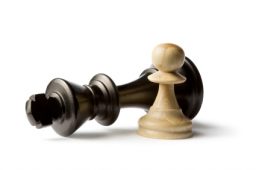WARGAME WEDNESDAY: Elements of Wargaming: The Illusion of Equality (Part 1)
Wednesday , 26, July 2017 Wargames 1 Comment In several of my previous articles in this space I have discussed how often war is fought on unequal terms, yet Wargames, especially tabletop Wargames, play things out with even forces. From the simple Risk to the more complex tournament games, the essentials of the Wargames which keep hobby shops alive through sales and events represent this navel-gazing viewpoint on the art of war: For things to be even or fair—two concepts a good commander seeks to avoid—the forces must be balanced, at least roughly.
In several of my previous articles in this space I have discussed how often war is fought on unequal terms, yet Wargames, especially tabletop Wargames, play things out with even forces. From the simple Risk to the more complex tournament games, the essentials of the Wargames which keep hobby shops alive through sales and events represent this navel-gazing viewpoint on the art of war: For things to be even or fair—two concepts a good commander seeks to avoid—the forces must be balanced, at least roughly.
Especially when it comes to such a studiable and historied subject as war and battle, it is laughable that systems which take thousands of hours of playtesting and teams of people writing and designing can only balance through the military units involved. Many of the board-and-counters games I have seen are built around a specific scenario, or perhaps one conflict zone, with everything from the weather and terrain to the supply levels and morale and technological level of the two sides into consideration—Can we not model this easily enough? Better yet, could we include these rich details into our games?
Let’s start with simple: We don’t change the systems at all, and we add something light and easy. How about each faction has three cards: One has a large point bonus, but includes a factionally-determined detrimental effect; one has no great effect, or an effect which can effect both sides equally, or a very small amount of victory points; and one has a factionally-determined benefit that is strong but has no victory points. The player who takes first turn gets to pick one of the cards and displays it first, and the person who lost the first turn gets to respond—giving designers yet another lever on the ever-pesky first-turn advantage to boot!
A designer could take this very in-depth and even re-launch existing products based on this addition to your system with booster packs, battle boxes, or new units revealed with mini-campaigns or cards to use when two specific factions fight as opposed to the generic cards and the purely factional sets—You even tie in some heroes or great generals, which could have their own special cards to pick from; A grizzled campaigner with a reputation, a risk-taking commander that can inspire his men…or maybe they doubt his sanity, a fat politician with a penchant for rewarding good soldiers after successes, the opportunities are vast and this is just a single, system-agnostic addition that any veteran could home-brew with friends. Many games include unique commanders, heroes, or command units–you can just as easily make such a concept abstract and fit it into any system.
If you were to devise a system like the above, you could also have easy levers to create fast scenarios and campaigns. In mission one, it’s a heads-up scrap while in mission two the defender has X card while the attacker has Y card. This can allow campaigns to be quickly thrown together, or at least planned out preliminarily. A tournament organizer could use this to spice up victory and defeats in the matches also, giving a sort of continuity to the matches to add to the fun. Another few options this style of system could be used to simulate is army supply or morale. Each faction could have a variety of responses to levels of supply or morale, depending on the discipline and style of that army or force. Low on ammunition or food? Maybe they get less movement or reduced rates of attack or firing. Plenty to go around? Models just as easily!
There is a substantial amount more which could be said, with a simple card-system like this able to help establish the often looked-for abstractions in a Wargame, possibly including terrain, but I’ve injected the idea already and to say more would be disrespectful of your mind. How would a modular system like this fit into your favorite games?
-Paul A.
The best games are not created from even, balanced forces, or even points-worth. The best games are created from a palette of advantages and disadvantages that give both (or all) sides a roughly equal chance of winning.
Axis and Allies is a good example of this. Most versions need a small adjustment, usually done by bidding for extra units, but each nation has its own advantages, which is what makes it fascinating.